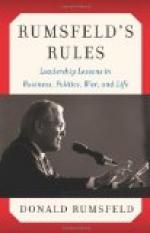No popular delusion is more extraordinary and none more widespread than the notion that there are two ways of looking at a war, one the military aspect and the other the governmental or civil aspect, that both are legitimate, and that, as the Government is above the general, in case of a clash the military view must fall into the background. This notion is quite wrong, and the more important the position of the men who have got it into their heads, the more harm it does. There is only one right way of looking at war, and that consists in seeing it as it is. If two men both take a true view of an operation of war, they will agree, whether they are both soldiers, both civilians, or one a soldier and the other a civilian. It does not matter what you call their view, but, as a soldier who knows his business ought to have true views about it, the proper name for the true view is the military view. If the civil view is a different one it must be wrong. In this case the belief that a retreat from a position to which troops had been sent would have a bad effect was no doubt founded on fact. But for that reason the troops ought not to have been sent there until it was ascertained that the forward move was consistent with the best plan of campaign. Some person other than the general charged with the defence of Natal had been arranging his troops for him without consulting him, and had done it badly. Then came the question of moving them back, and the probable “bad effect” was raised as a scarecrow. But the reply to that was that the bad effect of retreat is not half so bad as the bad effect of defeat, or of the embarrassments of a position which, being strategically wrong, may involve mishaps.
When a civil government moves troops in connection with war it ought to move them to the right places; that is according to sound strategy or sound military principles. In short, whoever deals in war ought to understand war. The reader may think that a commonplace, but in reality it is like too many commonplaces—a truth that very important people forget at critical moments. The first principle of action in war is to have two men to one at the decisive point. How comes it, then, that for six weeks Sir George White has to defend Natal with one against two? Evidently the first principle has been violated. It came about exactly in the same way as the putting one of Sir George White’s brigades at Dundee. The Government managed it; it was a fragment of the civil view of war. How long, then, the reader may ask, should the civil view of war be allowed scope and when should the military view be called in? Let me be permitted to alter the labels and instead of “military view” to say “view based upon knowledge”; and instead of “civil view” to say, “view not based upon knowledge.” I think that all dealings in war should be guided by the view based upon knowledge and that the other view should be for ever left out of account.




